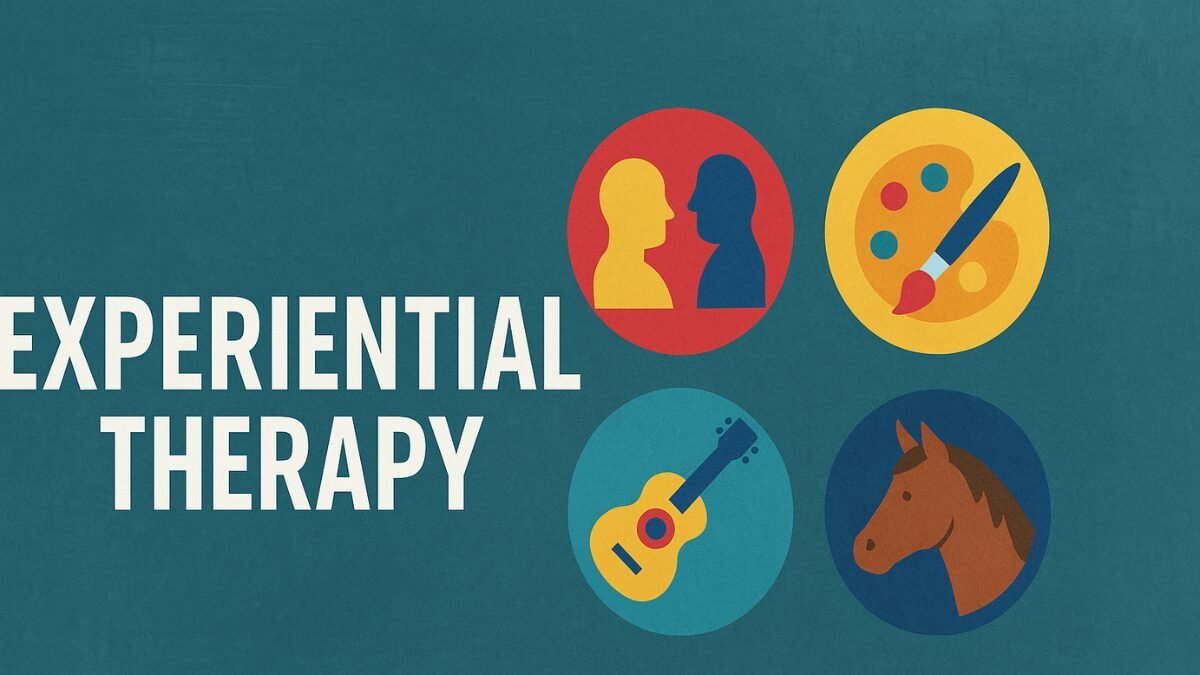Learn how Experiential Therapy empowers emotional healing through action-based techniques like role-play, art, and adventure. Explore its benefits, methods, and FAQs.
What is Experiential Therapy?
Experiential Therapy is a powerful form of psychotherapy that encourages individuals to identify and address hidden or suppressed emotions through guided experiences. Unlike traditional talk therapy, which often focuses on verbal communication, Experiential Therapy uses tools such as art, music, role-play, movement, or animal-assisted interaction to allow patients to engage more deeply with their emotions.
This therapeutic model is rooted in the belief that people are more likely to process and release unresolved trauma and stress when they physically act out or experience what they feel.
How Does Experiential Therapy Work?
In Experiential Therapy, clients participate in activities that help reveal thought patterns, emotions, and behaviors often inaccessible through discussion alone. These experiences are typically guided by a therapist who observes and interprets behavior, then works collaboratively to explore their significance.

For example, someone dealing with grief may be asked to write a letter to a deceased loved one or re-enact a memory to tap into deep-seated emotions. The goal is not performance but emotional expression and understanding.
Key Techniques Used in Experiential Therapy
Experiential Therapy isn’t limited to one approach. Instead, it comprises various techniques that can be adapted to suit individual needs. Here are some commonly used experiential modalities:
1. Psychodrama
A structured form of role-playing where individuals act out scenes from past experiences to gain insight and emotional release.
2. Art Therapy
Through drawing, painting, or sculpting, clients express their inner world, often revealing subconscious thoughts.
3. Music Therapy
Using instruments, voice, or music listening, clients explore their emotional responses.
4. Equine-Assisted Therapy
Working with horses to build trust, empathy, and emotional awareness in a non-verbal environment.
5. Adventure Therapy
Outdoor activities like hiking or climbing are used to build resilience and process emotions through physical challenge.
Benefits of Experiential Therapy
Experiential Therapy offers wide-ranging benefits for people from all backgrounds and with various mental health conditions. It’s particularly effective for those who find it difficult to express themselves verbally or who have experienced trauma.
List of Core Benefits:
- Improves emotional expression
- Encourages self-awareness
- Builds interpersonal skills
- Supports trauma processing
- Reduces anxiety and depression
- Enhances coping mechanisms
- Promotes creativity and mindfulness
Many people find Experiential Therapy to be more engaging and rewarding than traditional approaches because it focuses on doing rather than simply talking.
Who Can Benefit from Experiential Therapy?
This therapy is not restricted to any one demographic or diagnosis. It is widely used in individual, family, group, and even couple settings.
Table: Common Conditions Treated with Experiential Therapy
| Mental Health Condition | How Experiential Therapy Helps |
|---|---|
| PTSD and Trauma | Reenacts and safely processes traumatic memories |
| Depression | Expresses and transforms repressed emotions |
| Anxiety Disorders | Encourages relaxation and emotional expression |
| Substance Abuse and Addiction | Identifies root emotional triggers |
| Eating Disorders | Improves body awareness and self-esteem |
| Relationship Issues | Enhances empathy and communication |
| Grief and Loss | Helps express unresolved sorrow |
Experiential Therapy vs Traditional Talk Therapy
While both forms of therapy aim to promote emotional well-being, their methodologies are quite distinct.
Talk Therapy (Cognitive Approaches):
- Focuses on cognitive distortions and verbal processing.
- Typically structured with regular conversation.
- Insight is gained through rational reflection.
Experiential Therapy:
- Involves physical and emotional experiences.
- Less structured and more immersive.
- Insight is gained through emotional breakthroughs.
That said, many therapists integrate both approaches to offer a more holistic treatment.
The Role of the Therapist in Experiential Therapy
The therapist in an experiential session plays a dynamic role. Rather than simply listening, they guide activities, prompt reflection, and sometimes participate alongside the client. Their presence is critical in creating a safe environment where clients feel free to explore their emotions without judgment.

They are trained to interpret non-verbal cues, understand metaphorical communication (such as art or body movement), and help clients draw meaningful connections between their actions and internal states.
Is Experiential Therapy Evidence-Based?
While Experiential Therapy may seem unconventional to some, it is backed by a growing body of research. Studies have shown positive outcomes for patients suffering from trauma, addiction, and behavioral issues.
One study in the Journal of Psychodrama, Sociometry, and Group Psychotherapy noted that experiential practices significantly improved emotional regulation and reduced relapse rates in addiction recovery programs.
Moreover, when combined with cognitive-behavioral therapy (CBT) or dialectical behavior therapy (DBT), Experiential Therapy can accelerate progress and deepen emotional healing.
Finding the Right Experiential Therapist
When looking for a therapist skilled in experiential modalities, it’s important to:
- Confirm their certification and training in experiential techniques.
- Ensure they have experience with your specific concern.
- Seek someone you feel emotionally safe and comfortable with.
- Ask whether they combine experiential techniques with other therapies.
Therapists may be licensed psychologists, social workers, counselors, or art/music therapists with specialized training.
FAQs About Experiential Therapy
Here are 10 additional frequently asked questions to help you further understand the power of Experiential Therapy:
1. How long does Experiential Therapy take to show results?
Results vary, but many clients report emotional breakthroughs within a few sessions. Long-term change often requires consistent engagement.
2. Is Experiential Therapy suitable for children?
Yes, it’s often used with children because of its interactive and expressive nature, especially through art and play therapy.
3. Can I combine Experiential Therapy with medication?
Absolutely. It complements psychiatric medications and other forms of treatment like CBT or DBT.
4. Do I need to be artistic or creative to benefit?
Not at all. The process focuses on expression, not artistic ability.
5. Is Experiential Therapy available online?
Some components can be adapted for virtual sessions, although certain activities work better in person.
6. Are there risks involved in Experiential Therapy?
While safe when conducted by professionals, deep emotional work may be intense. That’s why a trained therapist’s support is essential.
7. What should I wear or bring to a session?
Comfortable clothing is usually recommended, especially for movement-based or outdoor therapies.
8. How is success measured in Experiential Therapy?
Therapists track emotional progress, behavioral change, and improved interpersonal relationships over time.
9. Can Experiential Therapy help with chronic illness stress?
Yes. It helps individuals process emotions related to chronic pain or health anxiety.
10. What makes Experiential Therapy different from recreational activities?
The presence of a therapeutic framework and professional guidance makes it intentional, focused, and healing—not just recreational.
Conclusion: The Healing Power of Experience
Experiential Therapy stands out as a powerful tool for individuals seeking deeper healing beyond traditional therapy methods. By using creative and action-based approaches, this therapy empowers people to uncover, express, and process buried emotions in a safe and guided environment.
Whether through role-playing, art, or animal-assisted sessions, Experiential Therapy invites individuals to participate in their healing journey actively. Its benefits are numerous—from improving emotional resilience to helping process trauma—and it offers a refreshing path for those who may have struggled with more conventional therapeutic techniques.
If you’re searching for a transformative and empowering therapy option, Experiential Therapy could be the key to unlocking deeper emotional healing and personal growth.










